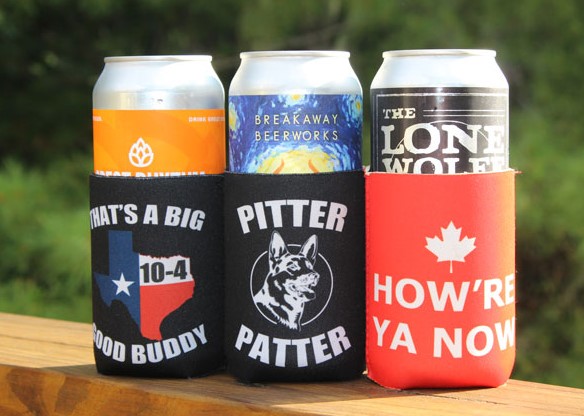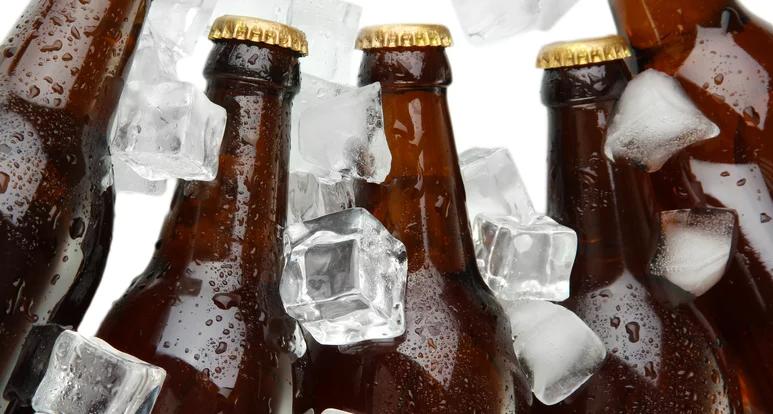Beer in the freezer can spoil the flavor. Beer is best served at room temperature, and freezing can destroy its subtle flavors. When left in a freezer too long, the beer can become “skunky,” a term used to describe beer that has absorbed certain compounds from the air.
Have you ever considered putting your beer in the freezer for a quick cool-down? Here’s why you shouldn’t – and what to do instead.
Beer can freeze just like water, and when it does, it expands and could burst the bottle or can. This is because water has a higher freezing point than alcohol. Therefore, you need to take precautions to prevent this from happening.

The best way to keep beer cold without freezing is by using beer koozies for bottles and cans. Beer koozies are easy to find on Amazon, providing insulation against heat exchange with the environment – perfect for hot summer days!
RELATED: How To Find The Best Materials For Beer Koozies
Why You Shouldn’t Put Beer in the Freezer
We’ve all had those days where we need a cold beer—like, really cold. But don’t think putting your beer in the freezer is a good idea!
Here are five reasons you should avoid putting your beer in the freezer.
1. Alcohol Content
The alcohol content of beer can lower its freezing point significantly. Depending on the type and alcoholic drinks, beers can freeze anywhere from -2°C to -20°C (28°F to -4°F). If your beer gets too cold, it may freeze solid, leaving you with a glass bottle of slushy liquid. Even if it doesn’t freeze solid, the freezing temperatures can cause an unpleasant taste when you drink it.
2. Pressure Increase
When liquids are placed in the freezer, their volume decreases as they cool because molecules move more slowly at lower temperatures. This decrease in volume causes pressure to build up inside the beer bottle or can.
As pressure builds up, it can cause cans and bottles to burst or explode, which is not something we want happening inside our freezers! It also affects carbonation levels released when the container is opened, resulting in a foamy mess and an unpleasant drinking experience.
3. Loss of Flavor
Another reason why you should never freeze beer is that freezing can alter its flavor profile. Temperature plays a vital role in how flavors present themselves, so when the beer gets too cold, it can taste bland or even unpleasant. The best way to ensure that your beer tastes excellent is by chilling it slowly at refrigerator temperatures rather than attempting to speed up the process by freezing it.
Putting beer in the freezer doesn’t make it taste better; quite often, it has the opposite effect. As beer cools down, certain flavor compounds become less noticeable while others become more pronounced.
This change in flavor profile means that many nuances that would typically be present may be lost due to over-chilling. The result is a flat-tasting brew that lacks complexity and character.
Related: Common Mistakes When Keeping Beer Cold
4. Exploding Beer Bottles
Beer bottles are made of glass, which tends to expand when exposed to freezing temperatures. When beer is frozen, the pressure inside the bottle increases as the liquid expands.
This can cause the bottle to burst, resulting in a sticky mess and an expensive cleanup. To avoid this, always check the temperature of your fridge before storing any type of beverage there.
5. Loss of Carbonation
Finally, freezing beer can cause a loss of carbonation due to ice crystals forming on the inside surface of a bottle or can and releasing some of its CO2 content into the atmosphere.
This means that when you thaw your frozen beer and drink it, you’ll get less fizz than average beer and possibly even a flat-tasting brew. For this reason alone, it’s best to avoid freezing your beer altogether if you want to enjoy its complete flavor profile and carbonation level.
How Long Can You Put A Beer In The Freezer?
Since cold water has a freezing point of 32°F (0°C), placing a beer in the freezer lowers its temperature. The quicker the beer reaches equilibrium with its surroundings, the cooler. It’s crucial to understand that freezing a beer does not make it “cold” in the way that we often use the word to describe alcoholic beverages. Freezing can harm a beer because it forms ice crystals, bursting the yeast’s cell walls.
How Long Till Your Beer Freezes and Explodes?
While freezing can be your go-to solution for chilling your beer fast, keep a close eye on them and take them out of the freezer before they explode. Your movie night or party plans may be ruined as a result. At 27°F (-2.7°C), the typical beer with 5% alcohol will begin to freeze.
Long-term storage in the freezer will produce ice particles, eventually expanding. The container will break if it is unable to withstand the expansion. Unfortunately, this might be disastrous if your beer is in glass bottles.
Nobody likes a warm beer, and while putting your brew in the freezer to get it as beer ice-cold as possible might seem like a good idea, this may be the wrong way to use your freezer. For starters, if it’s in a bottle or can, it will explode once it completely ices up, which is not only one less beer to be savored but also a big mess to clean up.
What Temperature Causes Beer Cans to Blow Up?
Beer cans should be frozen at 27 degrees. Beer cans have the potential to explode when frozen due to the pressure that is created inside of them as the liquid expands. Beer cans will begin to freeze at 27 degrees, and if left in the freezer for an extended period, the pressure will increase and cause them to explode.
The best way to keep your beer cold and ensure it tastes great is by chilling it slowly at refrigerator temperatures rather than attempting to speed up the process by freezing it.
This will help keep the flavor compounds intact and avoid potential issues like exploding cans or flat-tasting beer. But if you decide to freeze your beer, take it out of the freezer before it explodes!
Always check the temperature of your fridge before storing any beverage there. Keeping a watchful eye on your frozen beer and taking it out of the freezer before it reaches its limit is key to enjoying your ice-cold beer.
Conclusion
Beer in freezer temperatures can be dangerous, as it increases the pressure inside the bottle or can and can cause them to burst.
Additionally, beer freeze can lead to a loss of carbonation and a flat-tasting brew. It’s best to avoid freezing beer altogether and chill beer slowly at refrigerator temperatures to enjoy its complete flavor profile.
However, if you choose to freeze your beer, ensure you take it out before the pressure becomes too great and causes the cans or bottles to explode. Always pay attention to the temperature of your fridge before storing any beverage.
Read Next: How To Carbonate In Mini Kegs




